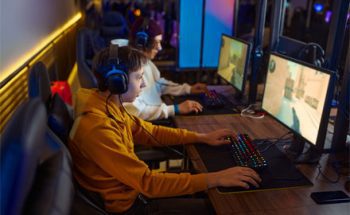NZ School Esports
ESPORTS AS A VEHICLE FOR ENHANCING WELLBEING FOR ALL STUDENTS
Gaming is becoming a major aspect of our students lives. Students are constantly surrounded by technology and the internet has become their social gathering place. Over 250 secondary school teams are currently using esports to help develop healthy gaming habits and confident, successful students.

If you’re looking for a local esports organisation to help you begin your esports journey, or possibly speak to your school stakeholders, use the button below to find a list of our local esport associations.
If you would like to compete with over 250 other secondary school teams around the country you can reach out to Victory-Up, the largest secondary school high school esports league in New Zealand.
MYTH BUSTING ESPORTS IN SCHOOLS
Esports is a new and emerging activity in our country. For many New Zealanders, it’s a new world that we don’t know a lot about and it can be intimidating to engage with.
On top of that, in the world of esports there are many negative myths that are not based in reality. These myths are easy to repeat, be can be seriously damaging, discouraging and isolating for students, players, teams, or volunteers who are passionate about esports.
Below are a few of the common myths we hear when talking to schools and new entrants to esports, and the honest truth behind them.
MYTHS
The World Health Organization included gaming disorder in the 11th revision of its International Classification of Diseases (ICD). As defined by the ICD-11, the main criterion for this disorder is a lack of self control over gaming. It impacts 1-3% of those who play video games.
However, esports is one of our most powerful tools we have to help combat this disorder. In the same way sport helps us learn about healthy habits, esports helps us learn about healthy gaming habits.
We live in a time where our students are particularly vulnerable to digital addiction of all forms, through social media, gaming, and streaming entertainment. Esports is a way to effectively engage students, and teach them the importance of proper sleep, gaming in moderation, and provides a supportive environment for them if they do need help.
In the year 2000, two studies appearing in the April issue of the American Psychological Association’s (APA) Journal of Personality and Social Psychology stated violent video games may be more harmful than violent television and movies because they are interactive. These studies involved 227 college students.
This narrative evolved into the myth that video games cause violent, and aggressive behaviour.
In 2020, researchers, led by Aaron Drummond from New Zealand’s Massey University, published a meta analysis in the Royal Society Open Science that re-examined 28 studies, including 21,000 young people from around the world from previous years that looked at the link between aggressive behaviour and video gaming.
Studies consistently find that the “long-term impacts of violent games on youth aggression are near zero”, they write.
“We call on both individual scholars as well as professional guilds such as the American Psychological Association to be more forthcoming about the extremely small observed relationship in longitudinal studies between violent games and youth aggression,” the authors conclude.
The false stigma of gamers being social outcasts, living in the basement is as old as the internet itself. This myth originates from one of the symptoms of gaming addiction being self-isolating behaviour.
However, esport in itself is a very social activity. It’s built around inclusive participation and breaking down social barriers.
The #1 reason why kiwis participated or attended esports events in 2021 was for the sense of community and belonging.
73.8% of the 896 kiwi gamers surveyed said they built friendships while gaming that extend beyond the game.
During the pandemic lockdowns, Digital New Zealand 2022 report indicated that 76% of parents played games with their children as a way to connect with them, and 3/4 kiwi games who play video games do so to stay connected socially.
The unique characteristic of esports is that when you pick up a controller, it no longer matters if you’re tall, short, young, old, male, female, what city you’re from, ethnicity, or race. You are competing and connecting with people on an equal playing field and making social bonds.
Double Paralympic Gold Medalist Rowan Crothers says it best:
“Esports has the potential to be absolutely massive for young people with disabilities, the ability to compete with their peers, on a fair playing field, non-contact, in a variety of engage sports, both team and individual, Just incredible…
…I got bullied so much in school. If I had esports as a way to compete with my peers, I could’ve formed friendships and found common ground with kids who otherwise saw me as an alien. I believe it has the potential to be a literal lifesaver for so many young people with disabilities.”
In a survey conducted in 2021 that involved 896 New Zealand gamers, we discovered;
- 81% of respondents were more open to participating in sports with friends they played games with.
- 44% of respondents had participated in sport or active recreation with friends they had first met while gaming.
Esports helps build confidence and connect students regardless of social barriers. This is the opportunity for the 1st XI Rugby captain to interact, connect and compete with the captain of the Robotics club and form friendships that wouldn’t have otherwise existed.
Some studies indicate that esports is a tool to engage traditional sport participation but formal research is still being explored. Early data released by FIFA indicates that as many as 20% of US players became interested in the sport of soccer through the FIFA video game.
Esports is primarily a competition of the mind. It is well documented that esports have many positive cognitive benefits that can also transfer into an academic setting.
A systematic review examining the neural bases of video-gaming found that video game players show enhanced attention functions, increased visuospatial functions, enhanced cognitive control, or the ability to manage tasks or information simultaneously (Palaus et al., 2017).
Various other studies cite an enhanced range of other cognitive abilities such as; processing speed, deductive reasoning, mathematical intelligence, greater sensitivity to contrasts, better eye-to-hand coordination and superior memory.
Not every sport is for every one. However, at it’s core defined by Sport NZ, the purpose of sport is to contribute to the wellbeing of everyone in Aotearoa New Zealand.
Even though esports is not a display of cardiovascular endurance or physical strength, esport involves fine motor skills, reaction times, leadership, problem solving, discipline, decision making, respect, mental fortitude, and many other attributes you find in traditional sport.
The inclusion of esports is important because it speaks to many kiwis who don’t currently participate in traditional sport, but can offer them the same benefits and provide a pathway to participation. We have 1.1 million kiwis who identify as having a visible or invisible disability which stops them participating in traditional sport.
Esport is a way to help those individuals build confidence in themselves, and make connections with people they might never have before.
Double Paralympic Gold Medalist Rowan Crothers says it best:
“Esports has the potential to be absolutely massive for young people with disabilities, the ability to compete with their peers, on a fair playing field, non-contact, in a variety of engage sports, both team and individual, Just incredible…
…I got bullied so much in school. If I had esports as a way to compete with my peers, I could’ve formed friendships and found common ground with kids who otherwise saw me as an alien. I believe it has the potential to be a literal lifesaver for so many young people with disabilities.”
The DNZ 22 report suggests that 1.2 million NZ households use 2+ game devices, and that 73% of New Zealanders play video games.
Whether we like it or not, students will continue to game. You have the choice on whether or not to provide a safe environment for them to do so.
Esports is an opportunity to engage with students in a structured, supervised and positive way. To teach safe and healthy habits associated with gaming, and rally them around the sporting values of teamwork, the sporting spirit, the importance of physical health and sleep.
The real risk is turning a blind eye and not being involved at all.
This myth generally stems from the concerns participating in esports will lead to gaming addiction, and impact sleep and other motivations.
As we’ve already addressed, esports is a great way to help form healthy habits around gaming to combat gaming addiction.
Esports specifically has many additional positive academic effects we’ve already mentioned, such as an enhanced range of other cognitive abilities such as; processing speed, deductive reasoning, mathematical intelligence, and superior memory.
However, games in general provide many positive impacts in academic environments. DNZ 22 findings:
- 78% of kiwi gamers say esports helps school remain relevant.
- 76% say gaming helps students connect to one another
- 83% say gaming helps overcome learning difficulties
- 80% say gaming inspire students to be creative
- 72% say gaming helps students pay attention
Esports is defined as organised, competitive gaming, and is the first time in which the worlds of sport and technology have collided.
Part of an effective esport curriculum should include techniques about how to be safe online, how to interact with others through the internet, and the importance of your data on the internet.
One of the most effective ways you can confidently participate in safe school esports is to look for the NZESF accreditation mark.
For tournament organisers to have an NZESF accreditation mark, they must meet a strict set of requirements that includes police background checks for individuals dealing with children, appropriate health and safety protocols, and privacy policies designed to protect NZ students data in line with the NZ Privacy Act 2020.
